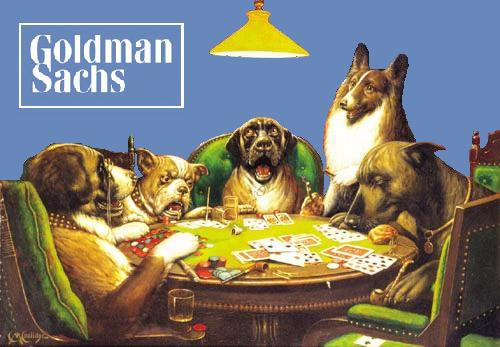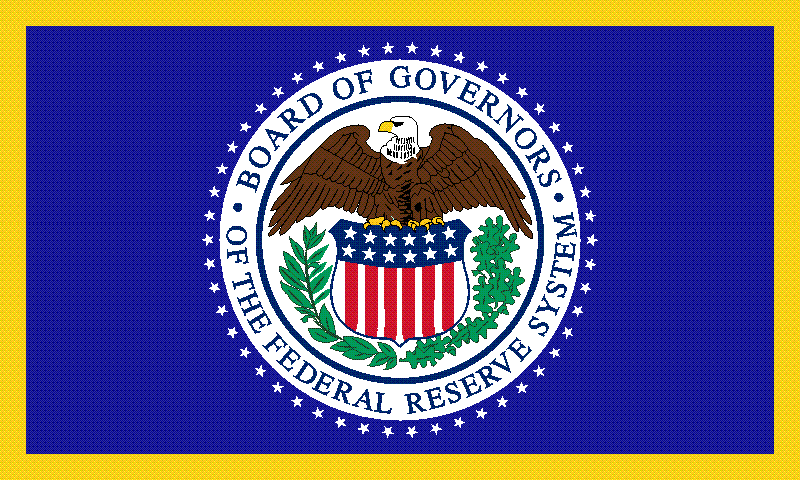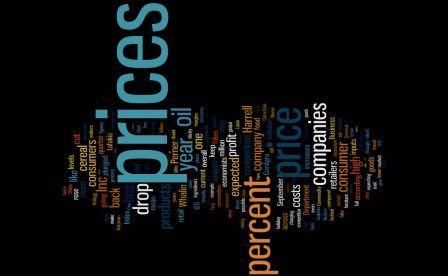With Switzerland’s central bank expecting to record big losses for 2013, it finds itself in a position where it will be unable to pay its usual dividends to the government and shareholders. This has been attributed mainly due to the decline in value of its gold holdings. However, Switzerland is not the only central bank to have taken a hit. Central banks worldwide own a staggering 18% of all the gold ever mined, with Russia increasing its reserves by 20% after prices reached a record $1,921.15 an ounce in September 2011. However, as central banks were busy buying, investors were losing confidence in the metal’s value. Did the world’s top economists at the central banks miss all the warning signs and why were they not rushing to sell? Oren Laurent’s latest article discusses the current situation and gives his verdict on whether this dependence on gold will pay off or not in the future. Read more…
Tag Archives: Goldman Sachs

Advancing Market Slump to Be Decade-Long According to Wall Street Banks
Advancing markets are not likely to recover quickly from the asset slump of last year that has left behind advanced-nation shares by the most since 1998, according to the biggest banks of Wall Street.
Goldman Sachs Group Inc. has been advising cuts as high as a third in developing nations investments, predicting “significant underperformance” for stocks, bonds, and currencies for the next decade. JPMorgan Chase & Co anticipates that local-currency bonds will post 10 percent of their average returns over a 10-year period, while Morgan Stanley expects the Brazilian real, Turkish lira, and Russian ruble will continue their decline after falling as much as 17 percent last year.
During the worst periods of the latest global financial crisis, the developing economies of Brazil, Russia, India, and China indicated their increasing power by delivering outsized returns, but as the U.S. Federal Reserve reduces its stimulus and allows interest rates to rise, Morgan Stanley expects some of the same developing nations to now prove laaggard. The MSCI Emerging Markets Index has dropped 3.2 percent this year, compared to the 1.3 percent decline of the developed-market index, and reached a four-month low yesterday as Chinese data indicated a weakness in manufacturing and services.

Gold Pares Weekly Loss But Set For Annual Drop
The Federal Reserve’s decision earlier this week to start cutting back on stimulus helped gold gain some of the ground it lost after closing at its lowest level since 2010. Accoridng to Goldman Sachs Group Inc., however, bullion’s downwards movement has not come to an end as the precious metal is set for its biggest annual decline since 1981.
The turbulent economic conditions around the globe that marked 2013 have diminished investors faith in gold as a store of value, sending it towards its first annual decline since 2000. On 18th December, the Fed decided to finally begin reducing its bond-buying programme from $85 billion to $75 billion. The decision pushed U.S. equities to record highs, while exchange-traded products that are backed by gold lost about $73 billion this year and mining companies dropped at least $26 billion.
Goldman’s head of commodities research in New York, Jeffrey Currie, said that “gold is now likely to grind lower throughout 2014. Much of the expected price decline has been priced in as opposed to a more gentle process as the Fed backs away from QE. When the gold market sees these events, it usually tries to price it in immediately.”

Wall Street Relieved that Volcker Rule Spares Market-Making
The ban on speculative trading that regulators have been crafting lets market-making operations unchanged allowing Wall Street banks to exhale a sigh of relief as the much feared Volcker rule is evaded.
The practise of market-making, or principle trading as it is also called, uses firm capital to purchase and sell securities with clients, generating profits on the spread and shifting prices. In propriety trading, however, banks use their own capital to place speculative bets. The Volcker rule, which has been dreaded by large institution, aims at preventing banks that hold federally insured deposits from engaging in such trades that pose a thread to their stability.
Goldman Sachs Groups Inc. (GS) is one of the big U.S. banks that receive the largest proportion of their profits from trading and receive a boost that sent it to its highest levels in nearly three months following the approval of the rule yesterday. Final edits to the wording widened exemptions originally proposed for banks’ market-making desks, which yield $40 billion per year profit.
The rule, which takes its name from former Federal Reserve Chairman Paul Volcker, ends the uncertainty over which actions would be permissible that lasted three years. The rule comes in a 900-page mega-volume that will surely be closely scrutinised to determine whether firms are engaging in hedging and market-making that are permitted rather than propriety trading.
The rule, of course, will not take place overnight, but gives banks another year to conform as the deadline has been moved to July 2015 as the regulators have recognised the inevitable complexity in both the rule and the business to which it pertains.















